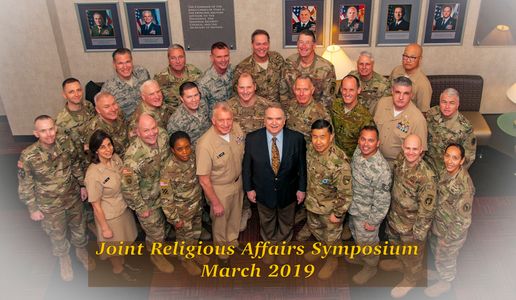Wallace Gives Keynote at Joint Religious Affairs Symposium
James C. Wallace, Lecturer in International Relations at the Frederick S. Pardee School of Global Studies, was the keynote speaker at the Joint Religious Affairs Symposium on “Strategic Religious Advisement and Global Integration” at the Pentagon held from March 5-7, 2019.
The conference took place under the aegis of the Joint Chiefs of Staff and included Command Chaplains from all six regional Combat Commands and various global Commands. The group was welcomed and addressed by General Paul J. Selva, vice chairman of the Joint Chiefs of Staff who spoke about the “profound effects” that religion can have on operations, particularly at the strategic level.
Wallace gave a presentation entitled “Eyes Outward: The Imperative of Strategic Religious Advisement Using China (PRC) and the Belt-and-Road-Initiative as an Example,” and spoke about the need for strategic religious advisement of senior commanders in the Combat Commands, the current state and structure of religious affairs in the PRC, and the religious risks of the Belt and Road Initiative.
The presentation drew from meetings that Wallace held in China last fall with senior PRC religion policy officials, and examined the full length of the Belt and Road and the religious dynamics present all along the overland and maritime routes – areas overseen by PACOM, CENTCOM, AFRICOM, and EUCOM.
Additonally, while at the Pentagon, Wallace was asked to provide a briefing to the Strategy, Engagement and Programs Directorate (J-5) of the Joint Chiefs of Staff. Wallace also made contributions to a White Paper – “Assessment of Joint Religious Affairs” – which will go out to all the U.S. military Combat Commands under the signature of JCS chairman, General Joseph F. Dunford, Jr.
Jim Wallace is a scholar, consultant, author, and religious leader and an adjunct faculty member at Boston University’s Pardee School of Global Studies. In addition, he teaches regularly at academic institutions in China including Fudan University, Shanghai University, and the Shanghai Academy of Social Sciences.
